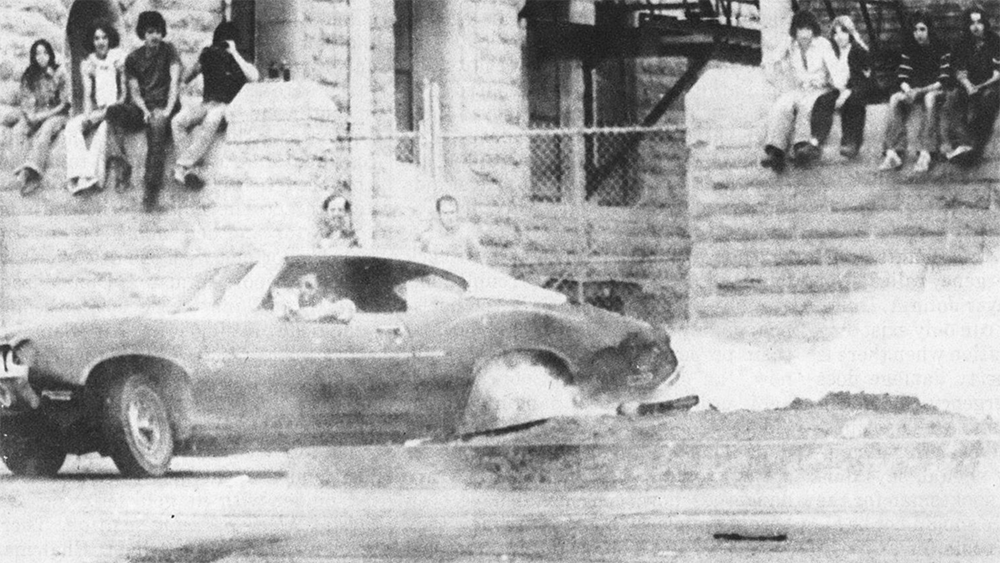When 71% of Bathurst’s employees walked off the job in 1979, hundreds took to the streets to party, get naked, and smash the biggest windows they could find.
Matt Carter

On June 9, 1978, the Bathurst Police Force walked off the job. The five officers on duty that day and some 21 off-duty officers set up picket lines to protest the terms of a wage rollback requiring members of the force to pay back roughly $575 over 24 months. The police union, CUPE Local 1497, wanted that period extended to sixty months. Year end bonuses were also at stake. The strike lasted just three hours ending in time for all involved to return home in time for supper. It was a short lived experience, but one that clearly demonstrated the fragility of municipal infrastructure and the need to keep one’s police force happy. Had the strike lingered longer than a run of afternoon soaps, who knows what might have happened? Unfortunately, the residents of Bathurst, along with the rest of the country, would see this question answered the following year. A national news story was just months away.
At midnight, December 31, 1978, the contract between the City of Bathurst and its police force expired. In addition to the 26 member police force, some 87 outside workers (CUPE Local 550) were also awaiting a new contract. Through the rest of the winter and into the spring and early summer, life in New Brunswick’s second smallest city moved along as usual. The local business community was looking forward to another tourist season and residents were preparing for the eighth annual Hospitality Days, the city’s largest community festival. But all that was about to change.
At 9 p.m. on Wednesday July 4, 1979, Bathurst Police walked off the job for the second time in just over a year along with the 87 outside workers including those responsible for garbage collection and the maintenance of the City’s sewage and water systems. Roughly 71% of the City’s employees were now on strike.

Hospitality Days had just begun but without a police force to monitor outdoor crowds during the week-long event, organizers pulled the plug after just one day. Canceled events included a parade, a softball tournament, a tug-o-war contest, fiddle and square dancing contests, a walk-a-thon, a paint-a-thon, a skateboard contest, a soap box derby and a beer bash sponsored by Labatt, Oland and Moosehead Breweries. The derby and the beer bash, however, would simply be modified to fit the circumstances. The derby would now involve actual automobiles racing on Main Street and the beer bash would no longer be a three brewery affair at the Bathurst Arena. It would be city wide with a strict BYOB policy.
For six nights, downtown Bathurst was ground zero for all forms of chaos and debauchery. The drag races on Main Street proved particularly popular, attracting rowdy partiers and curious onlookers alike. An article in MacLean’s claimed that after the early evening news ran on Sunday with a special feature on Canada’s newest party destination, the crowds lining the downtown streets quickly grew to six people deep.
But the action resulting from the strike extended well beyond championship racing. Like some super villain’s ultimate fantasy or the Saturday afternoon daydreams of a group of bored teenagers, no police meant no rules. And no rules usually means trouble. After seeing themselves on the news, it wasn’t long before shit went completely sideways. That Sunday, bottles were thrown and plate glass windows smashed. With local businesses under attack, police left the picket lines, put on their riot gear and cleared the street. The next day they returned to their posts on the picket lines but again, chaos returned.
The Monday July 9 edition of Hospitality Days 2.0 included a display of public nudity which quickly downgraded into sexual assault allegations forcing the police to once again abandon their strike and quell rioters. By this time, local businesses had assembled their own vigilante groups to line streetside entryways and protect properties and livelihoods. It was citizen against citizen at that point.
A settlement between the City and the police was reached the following day and new contracts were agreed upon. Almost. Not long after Bathurst Police officers returned to the job on Wednesday, one week after the strike began, an essential clause was found to be missing from the new agreement and so once again, weapons were locked up and picket signs were pulled from the trash and put back into use. This time, the issue was settled in a matter of hours.
Within a few days Bathurst was no longer a news story. The police force was back on the beat and so were the outside workers. The following week, Saint John City Police faced a strike vote of their own. Over the course of the three day negotiations residents of the province’s second largest city braced for the worst. Having just witnessed what happened in Bathurst, council would have probably done just about anything to avoid becoming New Brunswick’s next big news story.
“There’s no way of knowing what might have happened,” said Police Union President Cst. Gerry Shannon following the agreement. “The town could have been demolished in three hours, or there could have been thirty days without a broken window. If it hadn’t been for Bathurst, we’d have been on the street yesterday.”
One final note: Congrats to Christine McGrath, the “18 year old brunette with a ready smile and genuine charm,” who was named Miss Bathurst on the eve of the strike.
Related: That time Teenage Head played a pizzeria in Oromocto, sort of.
Related: That time Alice Cooper scared the pants off Fredericton.
Related: That time New Brunswick banned a David Lynch movie from theaters.
Related: That time Charles LeBlanc biked 9000 miles just to see if he could do it.
Related: That time a Fredericton indie theatre production of MacBeth won the internet.




